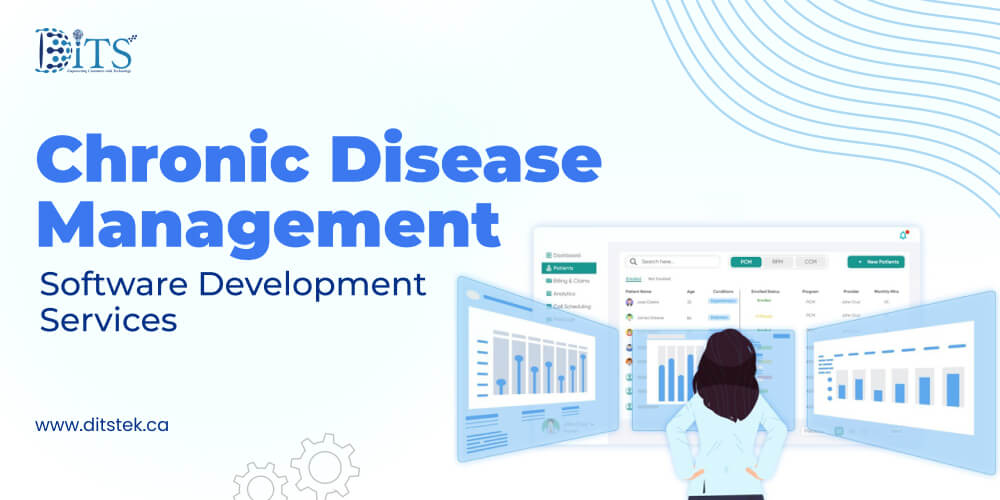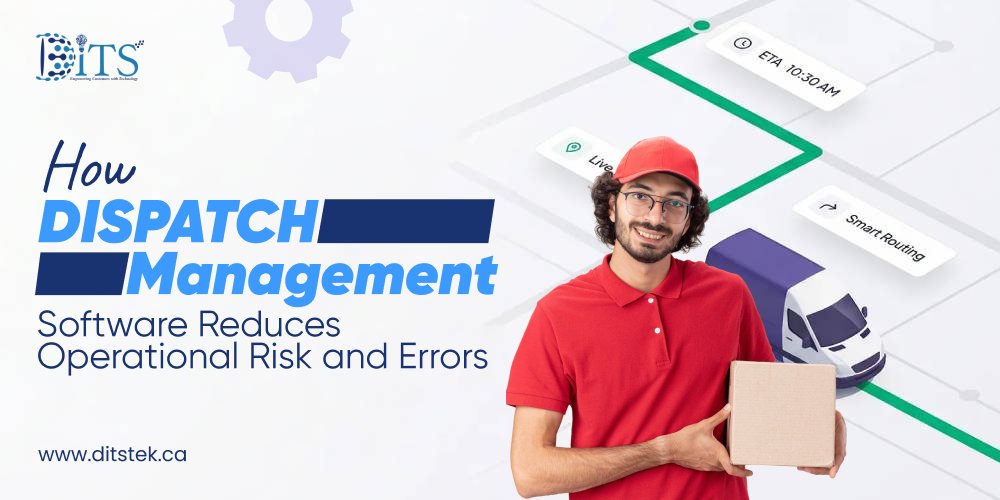Chronic Disease Management Software Development Services
Table Of Content
Published Date :
30 Oct 2025
Many people in Canada suffer from chronic diseases, and chronic diseases are increasing with time; healthcare providers need to pay attention. Diabetes, hypertension, and heart disease are no longer simply medical terms but real health issues for millions of Canadians.
To healthcare providers, managing chronic conditions involves not only proper treatment but also improving patients' health. Without the right tech tools and support, this journey can quickly become complex.
This is where Chronic Disease Management software becomes a powerful tool for doctors and healthcare providers. It allows teams to stay connected with medical staff and patients and identify potential health risks in advance.
Canadian healthcare organizations are beginning to understand that outdated models of managing chronic health issues no longer work today. To have instant access to an individual's Electronic Health Record, doctors and medical staff need advanced tools to provide better treatment and care.
In an industry where every minute counts, adopting the right tech tools not only improves patient care but also saves lives in critical conditions. Tools like chronic disease management software enable healthcare providers to deliver consistent, high-quality care without losing operational efficiency.
What is Chronic Disease Management
Chronic disease management is the process of evaluating, treating, and caring for patients with long-term health issues. It helps organize all patient information, including lab results, medications, and daily health readings, into one comprehensive place.
When chronic disease management software captures data to support remote patient monitoring tools, doctors can track real-time data such as blood pressure, glucose levels, and oxygen saturation, even when their patients are miles away.
Is your data slowing clinicians?
Consolidate records, labs, and notes into one secure platform that accelerates decisions, reduces duplication, and strengthens PHIPA/PIPEDA compliance organization-wide today.
Challenges Canadian Healthcare Businesses Face in Managing Chronic Illnesses
It is no secret that managing chronic conditions is not just another item on a to-do list. For many in the healthcare community across Canada, it is an ongoing practice of balancing patient care, regulatory requirements, and limited resources. Let's look at where healthcare organizations are really feeling the impact.
Fragmented Patient Information
Patient information is literally everywhere, whether it's in electronic health records, paper files, or spreadsheets. Fragmented information makes it difficult and certainly time-consuming to get a complete picture of a patient's health. In fact, a physician might have to search for three different systems just to make one informed decision. It is inefficient, and sometimes critical information is lost from the incident report.
Patient Load and Staffing
The number of patients suffering from chronic diseases is expected to increase due to Canada's aging population. Healthcare teams are striving to offer personalized attention to each patient while simultaneously managing administrative tasks. Because healthcare workers spend more time documenting, managing reports, and coordinating appointments, the time they spend directly providing care is decreasing.
Compliance & Data Security
Laws and regulations (e.g., PHIPA, PIPEDA) expect high public standards for data privacy and handling of information. However, if your organization still uses multiple systems, complying with privacy laws may feel challenging. Depending on the situation, non-compliance could lead to a security breach or even costly violations, something no organization wants to manage.
Communication Breakdown between Care Teams
More likely than not, doctors, specialists, and caregivers often work from their system. If they do not have the proper integrations to communicate, coordination with others becomes challenging. Examples of these challenges involve things such as repeated tests, contradictory instructions, or postponed treatment, which is frustrating for all involved.
Staff Burnout and Operational Burden
To top it all off, technology that does not facilitate these processes pushes healthcare providers into burnout. Manual processes, modular systems, and paperwork mean that healthcare providers expend their energy on non-patient care tasks. And ultimately, these processes negatively impact the quality of care.
Canadian healthcare businesses work hard with the limited means available. Still, to efficiently manage chronic illnesses, they will need a digital system to facilitate collaboration across providers, secure data, and untangle the complexity of care. This is where comprehensive software for chronic disease management comes in.
In short, chronic disease management services take existing models of care and make them smarter, faster, and infinitely more efficient, with the capacity to intervene earlier and foster continuity of patient engagement and their collaboration in recovery.
How Chronic Disease Management Software Solves These Problems
The truth is, healthcare teams don’t require more tools; they need more innovative tools. This is precisely what chronic disease management software provides. It integrates all aspects of patient care, transforming fragmented workflow into a cohesive system. Let's take a closer look at this.
Centralized Patient Data
A chronic disease management system consolidates all data (from medical history to lab results) into a single, secure location. Doctors can instantly access patient profiles, check medication history, and view lab reports from a single screen, rather than jumping from system to system. It's faster, cleaner, and much more reliable.
Real-Time Health Monitoring
Through remote patient monitoring, the software enables continuous tracking of vital signs, blood pressure, heart rate, glucose levels, etc. If something goes wrong, it immediately generates an alert to the care provider. It’s anticipatory care instead of reactive treatment. The software monitors a patient's care and chronic condition even after recent office visits, providing them with peace of mind.
Automated Notifications and Task Management
The software does not simply store information; it anticipates proactively. It sends patients automated reminders to take their medicines and schedule checkups. Care teams receive alerts when patients miss appointments, reports are delayed, or a patient's health status deteriorates. Nothing falls through the cracks, and the whole process feels more contained.
Predictive Intelligence and Prevention
With AI in healthcare, these systems can now analyze patient data and identify early warning signs using AI enabled software. AI-based systems that respond to emergencies by adjusting medications or scheduling follow-up, which is the type of service that the traditional care system rarely provides.
Easy Collaboration and Integration
One significant benefit of this software is that it improves communication. This software acts as a conduit to all existing healthcare systems, enabling doctors, nurses, and specialists to share information. Everyone has access to all patient information, and patients will have a consistent continuum of care.
By clarifying workflows and automating repetitive task management, chronic disease management software allows healthcare organizations to refocus on what matters most: patient care.
Want proactive patient monitoring?
Leverage AI insights and remote vitals to flag risks early, automate outreach, and support preventive chronic disease management between appointments.
Key Benefits for Healthcare Providers
Even the tiniest change can have a tremendous impact on long-term care, both for patients and healthcare providers. That is why more healthcare organizations across Canada are looking toward chronic disease management programs.
Enhanced Patient Outcomes
Improved consistency in care makes all the difference. Real-time visibility and standardized follow-ups allow doctors to intervene at the early signs of a health condition. The patient receives an easy-to-follow treatment plan when language and treatment are personalized. In the case this leads to less hospital readmissions over time, with an improved overall well-being, that is the goal of chronic care!
Operational Effectiveness
A chronic disease management system automates tasks like sending reminders, updating records, or generating reports, without the need for manual intervention. Clinics benefit by spending less time on paperwork and more time with patients. Clinics often feel confident taking on larger caseloads without adding staff, a winning proposition in today's stretched healthcare system.
Data-Driven Decision-Making
Individual calculations in healthcare have become obsolete. Now every patient is tracked, and their data stored in one analysis for future use. Clinics can decide on evidence-based practice for the next patient with similar treatment patterns from the previous assessment. Data will show graphic trends, outcome measures, and attempts and will predict outcomes and plan for future intervention. Decisions are no longer based on experience alone but on evidence.
Greater Involvement of Patients
Patients today want to be proactive participants in their care journey. They can now be involved through mobile apps & patient portals developed by a healthcare mobile app development company, and they can check their reports, track progress, and communicate directly with their physician. This increases their adherence to the recommendations, as well as satisfaction and trust in their care team.
Compliance and Data Security
Ensuring data privacy in Canadian healthcare is also essential. Chronic Disease Management solutions ensure compliance with multiple industry standards, including PHIPA and PIPEDA, by protecting and securing every patient's recorded information. Role-based access, encryption, & secure cloud hosting approaches make compliance manageable & safe.
All of these elements intertwine to produce visible transformation, smooth workflow, happier staff, & healthier patients. This is what integrating intelligent chronic care solutions into your organization means: providing.
Why It’s Important for Canadian Healthcare Businesses
Healthcare in Canada has always had a unique set of challenges in the form of vast geography, diverse populations, and an aging population that is increasingly reliant on ongoing support. Chronic Disease Management software represents an increasingly vital component of modern healthcare operations.
Need for Long-Term Care
Chronic diseases are responsible for nearly 70% of deaths in Canada, and conditions such as diabetes, cardiovascular issues, and respiratory illness have been steadily increasing. Clinics and hospitals are being tasked with providing support for ongoing care and not just one-off encounters. Chronic care solutions are designed to track patient progress and provide ongoing support without placing additional burden on staff.
Value-Based Care
Canadian healthcare systems are moving from a reactive to preventive care model with emphasis on positive patient outcomes, which must also use resources effectively. A digital platform for chronic disease management service balances these factors by eliminating unnecessary hospitalizations, encouraging patients to manage their care, and helping contain healthcare costs.
Support for Remote Locations
Due to significant distances between patients and specialists or regular care, it is often not practical to provide support. Using digital monitoring, coupled with telehealth, patients with chronic conditions can be seen right away from where they are located. It helps overcome barriers to care to ensure that patients residing in remote areas of Canada can handle proactive and planned follow-ups and interventions in a timely manner.
Regulation/Digital Health Incentive
Canada's healthcare system is transforming rapidly. National programs, such as Canada Health Infoway, are coordinating efforts to modernize the healthcare system with interoperable digital solutions. Chronic disease management platforms fit easily into these national programs and regulations while providing a more efficient, compliant, and connected health care trajectory.
For Canadian healthcare organizations, investing in chronic care technologies is creating a sustainable, scalable care model that accommodates future growth.
Ready to modernize chronic care operations?
Discover how custom chronic disease management software unifies data, streamlines workflows, and enables proactive monitoring across clinics without disrupting systems.
How Does DITS Help Healthcare Organizations in Canada?
At DITS, we strive to create software that enhances connectivity, and streamlines care delivery. We build software for healthcare that fits your organization’s workflow, not the other way around. Our development team integrates electronic health records, develops remote monitoring capabilities for patients with chronic illness, or creates a mobile app for patients tailored to your specifications.
Overall, we will utilize our AI capabilities for software development at every stage, from coding and testing virtually error-free code to quality assurance testing to optimizing every system. Artificial intelligence helps us identify all possible issues and manage peak performance, while tailoring to each client.
A major benefit of artificial intelligence is that it helps us develop software faster and precisely, creating more reliable products for real-world use.
As a trusted healthcare mobile application development company, we exist to help health organizations better engage their patients through secure, easy-to-use applications that ultimately support care coordination and maintenance related to chronic illness over time.
Conclusion
Chronic diseases won't slow down, and neither should the systems that address them. For healthcare organizations across Canada, investing in tech solutions for Chronic Disease Management is essential. Real-time patient monitoring, early disease prediction, and personalized care can completely transform how we engage with chronic diseases.
The reality is that technology doesn't replace the human experience; it enhances it. By integrating more intelligent systems with chronic disease management services, healthcare providers can stay ahead of patient needs, reduce staff burden, and maintain operational effectiveness. It's about combining human care with technology.
At DITS, we believe healthcare should simplify care, not complicate it. We partner with Canadian healthcare organizations by providing custom software development services to develop secure AI-based systems to achieve better outcomes, lower costs, and happier patients.
FAQs
What Is The Main Goal Of Chronic Disease Management Software?
The most important task is to improve healthcare facilities' monitoring of patients with chronic diseases and to help them better manage these patients. Improved patient tracking, communication, and early intervention lead to better health outcomes and fewer hospital visits.
How Does Chronic Disease Management Software Improve Patient Outcomes?
It maintains patients’ involvement in their care through frequent follow-ups, telemonitoring, and individualized care plans. Doctors, because of the real-time health insights, can intervene before the problem develops, leading to more stable and preventive care.
Is Chronic Disease Management Software Compliant With PHIPA And PIPEDA?
Yes. Most reputable systems are built to meet Canada’s strict data protection laws, such as PHIPA and PIPEDA. They include features like secure data encryption, role-based access, and audit trails to maintain complete privacy and compliance.
Can This Software Integrate With Existing EHR Or Telemedicine Systems?
Yes, indeed. The recent chronic care management solutions are designed to be interoperable. They work with EHRs, telemedicine platforms, and other digital solutions without any hurdles to create a central system that serves all, including doctors, patients, and specialists.
How Much Does It Cost To Develop Custom Chronic Disease Management Software In Canada?
The price is determined by the functionalities, the complexity of the project, and the integration requirements. As a rule, the cost of an entirely personalized platform built by a skilled partner like DITS, who is also providing custom software development and AI-enabled optimization services, balances perfectly the factors of cost, scalability, and long-term value.

Nidhi Thakur
With more than 19 years of experience - I represent a team of professionals that specializes in the healthcare and business and workflow automation domains. The team consists of experienced full-stack developers supported by senior system analysts who have developed multiple bespoke applications for Healthcare, Business Automation, Retail, IOT, Ed-tech domains for startups and Enterprise Level clients.
Recent Posts

Digital transformation in healthcare streamlines operations, reduces administrative waste, strengthens revenue cycles, and enables data-driven decisions that support sustainable cost control and improved care delivery.

Reduce operational risks and errors by replacing manual, spreadsheet-based processes with dispatch management software.

Discover how bespoke MVP development services help Canadian companies reduce product risk, validate ideas faster, and build scalable products with confidence.